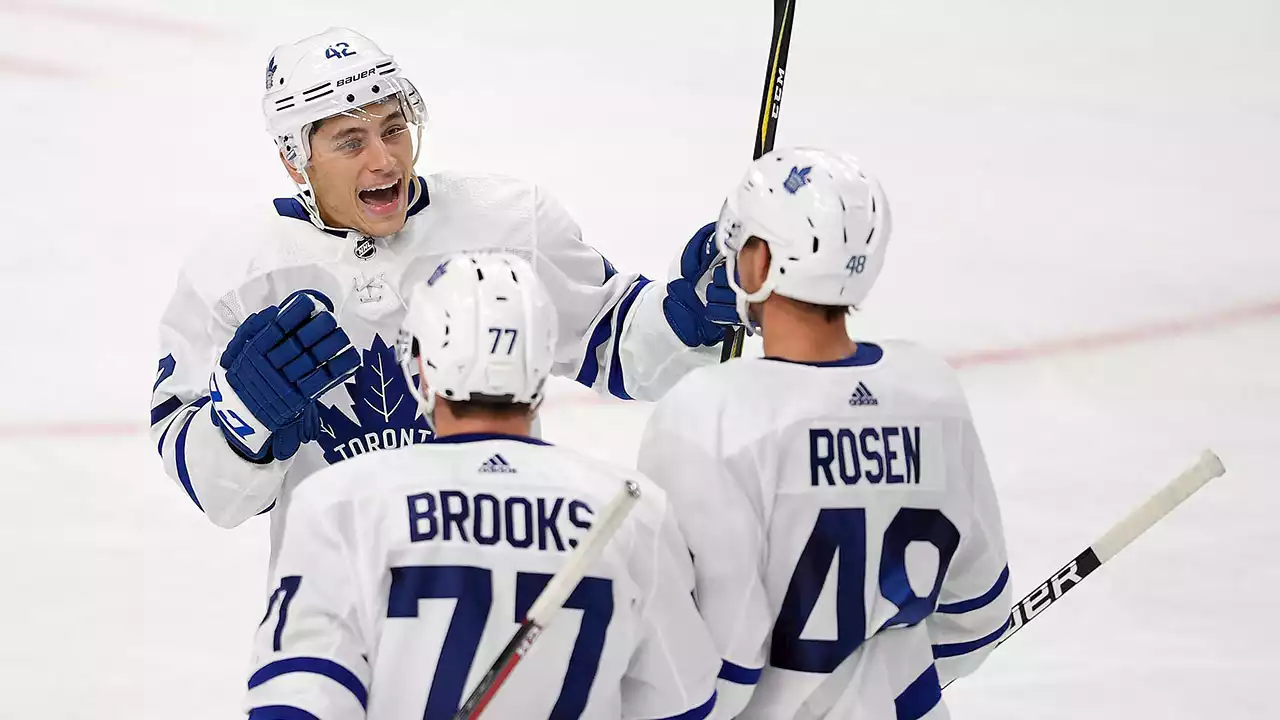
Maple Leafs Season Preview: Could this be the year Toronto slays its demons?
TORONTO – Paul MacLean is clutching an honesty gun and spraying a Toronto Maple Leafs front-office meeting room with truth bullets.
“They’ve got to help themselves somehow,” the wise advisor says. “They’ve got demons in their heads. They’ve got them in their car. They’ve got them under their f—ing beds. Everywhere they turn, there’s a f—ing demon.
“The biggest obstacle this team has is themselves.”
MacLean’s speech, captured in the All or Nothing docuseries, is being delivered to general manager Kyle Dubas and head coach Sheldon Keefe following consecutive overtime losses in games 5 and 6 of the 2021 playoffs and before the team’s tepid rollover in another Game 7.
The demons danced.
The players wept.
And the sport’s longest-suffering fans boiled.
Is it hubris or belief in the Maple Leafs’ quadruple-barreled top-end skill that keeps encouraging decision-makers in the mecca to run it back, now for a sixth time, with a core that dazzles in the leadup but fails when it matters?
This spare-no-expense organization has lost its past five do-or-die playoff games (four Game 7s and Game 5 to Columbus in 2020).
In 2018, these Leafs blew three one-goal leads in Game 7 in Boston.
In 2019, they held three one-game leads over that same rival and still lost.
In 2020, they carried storybook momentum into a hometown bubble and got shut out 3-0 in Game 5 to the lower-seeded Blue Jackets.
In 2021, they had it locked up, didn’t they? Up 3-1 on the 18th-place Montreal Canadiens, their clearest path to the final four in sight, the Leafs bowed out by dropping three one-goal contests, two in OT.
Forget 1968 or 2013. The current core is 0-and-7 in opportunities to eliminate a post-season opponent.
No wonder swaths of Leaf Nation are approaching Wednesday’s season-opener (against the Habs, hey!) with a shrug and a “Wake me when it’s April.”
No wonder Dubas’s most important off-season target wasn’t a particular player, per se, but something more abstract: killer instinct.
“We’ve had moments and opportunities to put teams away, and we haven’t done that yet,” Dubas says.
“[We’re] trying to help our people and our staff and our coaches be at their best in moments when pressure comes, and I think we just have to lean into that. We can’t run from it. We can’t hide from it. We have to prepare each and every day, because that’s what it’s going to take. In order to get to those moments and be excellent in those moments, you have to live here every single day, in practice, in the gym. And be ready for when the light shines brightest.”
The off-season loss of workhorse and forechecker extraordinaire Zach Hyman hurts. The loss of the overworked Frederik Andersen, less so.
In rolling through a 5-1 preseason, outscoring the opposition (Montreal and Ottawa exclusively) by a whopping 23-10, buzz is gathering around bargain pickups Nick Ritchie, Michael Bunting, Ondrej Kase and David Kämpf.
Lacklustre special teams have been given a refresh in personnel, positioning and philosophy from new assistants Spencer Carbery (power play) and Dean Chenoweth (penalty kill).
“We saw how organized they are,” Ottawa coach D.J. Smith says. “They’re playing real hockey right now. They look motivated. They look like they’re on a mission. After their loss last year to Montreal, they look like they’ve come back with a purpose.”
Keefe claims his 2021-22 group is deeper than last year’s.
Yet the Maple Leafs’ most critical addition will not appear on a CapFriendly chart.
Renowned peak performance coach Greg Harden has worked with non-hockey champions Tom Brady, Michael Phelps and Desmond Howard on their mental game.
Now, Harden has set about banishing those ghouls frolicking between the ears of the Maple Leafs, meeting one-on-one with both players and coaches.
“You don’t hire somebody like Greg Harden. He decides whether or not he wants to come work for you. And we’re fortunate enough that you decided to join us,” Keefe says.
“He’s got great experience. Comes in with a fresh voice, fresh set eyes in terms of what’s happening here. He’s a guy that’s going to take his time to build relationships and let players know what he’s about and how he can help us.”
Jason Spezza describes Harden as “a straight shooter” who should help the players thrive in the sludge of the regular season. Harden has already aided captain John Tavares in pushing through the trauma of coming back to the game after his horrendous concussion in Game 1.
The mental side of athletics is critical, and the Leafs are taking pains to flip the script and remain sharp.
“Sometimes you get into your own mind, and sometimes it’s hard to dig yourself out of it,” admits Wayne Simmonds, who saw the benefits of taking to someone as a young player with the Flyers. “When you have a professional helping you out, and helping you navigate the way through the mental game, it makes it a lot easier.”
Absolutely, we’ll distract ourselves this winter with hyper-analysis of the $45.5-million power play. We’ll debate ad nauseam over whom should get the next start, Jack Campbell or Petr Mrazek, or who should occupy left wing on the top line.
We’ll calculate Auston Matthews’ campaign to snipe 50 or 60. We’ll monitor “own rental” Morgan Rielly’s contract year and Rasmus Sandin’s bid to break out and William Nylander’s penalty-kill debut.
Eighty-two games will be a long haul. And as sports nuts, we’re addicted to our distractions and our minutia.
Ultimately, however, the worthiness of this ship president Brendan Shanahan and Dubas have built will be judged on how it cuts through the turmoil of the post-season.
Matthews and Marner. Tavares and Nylander. Do they dominate? Or get dominated, again?
“We can’t change anything, unfortunately. That’s not the way it works,” Keefe says.
A rearview mirror is right there, fastened to the windshield, reflecting demons dancing on the tailgate. But the coach, like the rest of them, will do his damnedest to focus on the road ahead.
“All we can do is the work here today,” he states. “We have to be consistent in our habits, our details, our mindset, and — most importantly — our belief.”



